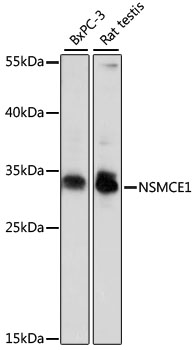-
Product Name
NSMCE1 Polyclonal Antibody
- Documents
-
Description
Polyclonal antibody to NSMCE1
-
Tested applications
WB
-
Species reactivity
Human, Mouse, Rat
-
Alternative names
NSMCE1 antibody; NSE1 antibody; NSE1 homolog, SMC5-SMC6 complex component antibody
-
Isotype
Rabbit IgG
-
Preparation
Antigen: Recombinant fusion protein containing a sequence corresponding to amino acids 7-266 of human NSMCE1 (NP_659547.2).
-
Clonality
Polyclonal
-
Formulation
PBS with 0.02% sodium azide, 50% glycerol, pH7.3.
-
Storage instructions
Store at -20℃. Avoid freeze / thaw cycles.
-
Applications
WB 1:500 - 1:2000
-
Validations

Western blot - NSMCE1 Polyclonal Antibody
Western blot analysis of extracts of various cell lines, using NSMCE1 antibody at 1000 dilution.Secondary antibody: HRP Goat Anti-Rabbit IgG (H+L) at 1:10000 dilution.Lysates/proteins: 25ug per lane.Blocking buffer: 3% nonfat dry milk in TBST.Detection: ECL Basic Kit .Exposure time: 10s.
-
Background
RING-type zinc finger-containing E3 ubiquitin ligase that assembles with melanoma antigen protein (MAGE) to catalyze the direct transfer of ubiquitin from E2 ubiquitin-conjugating enzyme to a specific substrate. Within MAGE-RING ubiquitin ligase complex, MAGE stimulates and specifies ubiquitin ligase activity likely through recruitment and/or stabilization of the E2 ubiquitin-conjugating enzyme at the E3:substrate complex. Involved in maintenance of genome integrity, DNA damage response and DNA repair. NSMCE3/MAGEG1 and NSMCE1 ubiquitin ligase are components of SMC5-SMC6 complex and may positively regulate homologous recombination-mediated DNA repair. MAGEF1-NSMCE1 ubiquitin ligase promotes proteasomal degradation of MMS19, a key component of the cytosolic iron-sulfur protein assembly (CIA) machinery. Down-regulation of MMS19 impairs the activity of several DNA repair and metabolism enzymes such as ERCC2/XPD, FANCJ, RTEL1 and POLD1 that require iron-sulfur clusters as cofactors.
Related Products / Services
Please note: All products are "FOR RESEARCH USE ONLY AND ARE NOT INTENDED FOR DIAGNOSTIC OR THERAPEUTIC USE"
